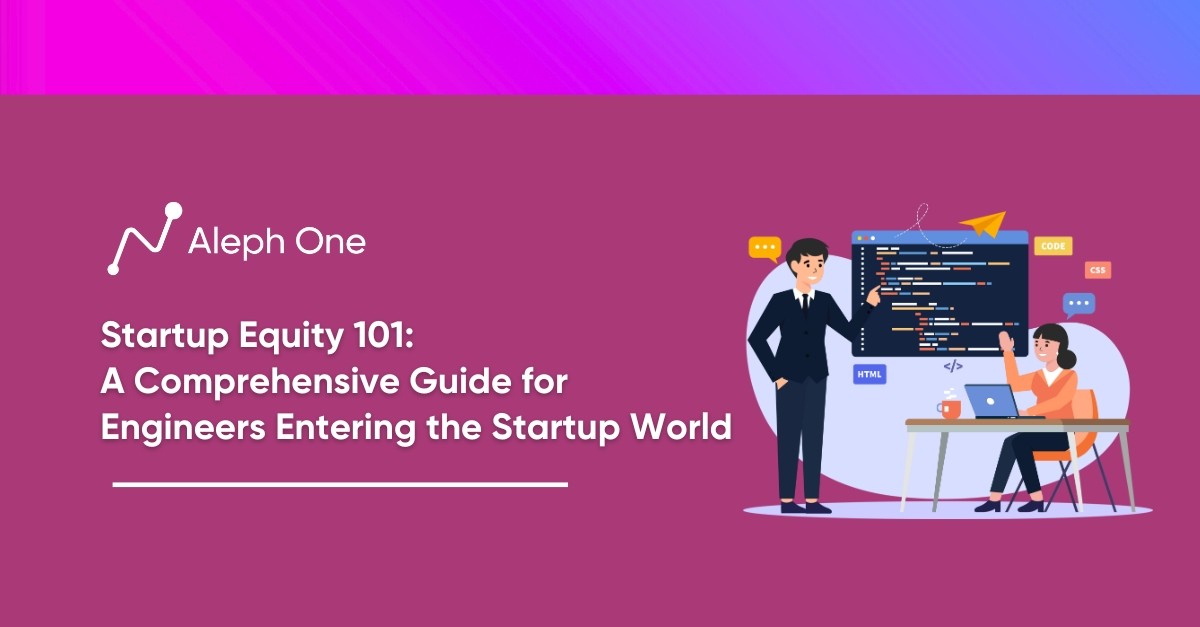Let’s work together to build something amazing. Share your project details and our team will reply to figure out the next steps to your success.

Here is an example situation: Jenny was an engineer at a fast-growing startup. She joined when the company was just ten people and worked grueling hours to build their product. A few years later, the startup sold for $200 million. Jenny was excited to get her big payout. However, she was shocked to learn she would only receive $50,000.
She needed to understand how to negotiate a fair trade package for her equity. Like many engineers, she needed clarification on equity terms and avoided pushing for more details. This cost her the opportunity to earn life-changing wealth from her work.

The Hard Truth: Equity is Complex but Critical
Unfortunately, Jenny’s story is not unique. According to estimates, the average engineer earns only about $10,000 to $30,000 per year of work from startup equity. While some make six or seven figures, many walk away with little or nothing. This is sobering, given the long hours and opportunity cost required at most startups.
The hard truth is that equity is a highly complex topic. However, for startup engineers, it is also critical to understand. Equity represents most of your potential compensation at most startups, wildly if the company succeeds. While the details of equity terms can be tedious, not understanding them can cost you hundreds of thousands or more.
Understanding Equity Leads to Better Package Negotiations
The good news is that equity does not have to be a mystery. With some upfront learning and preparation, engineers can understand the basics and confidently evaluate startup equity offers. They can negotiate fair packages that appropriately reward them for the value they are helping to build. They can make equity a rewarding part of their compensation rather than a frustrating or regretful experience.
Equity is the foundation of wealth creation in Silicon Valley and beyond. For startup engineers, understanding equity is critical to unlocking financial opportunities and gaining more control over your career. With the right knowledge and mindset, equity can be very rewarding. But without them, it is easy to get left behind holding options worth little more than the paper they are printed on.
How to Value a Startup’s Equity: It’s All About Potential
A startup’s equity is valued based on its potential future exit, not its current value. As an engineer, you must evaluate the startup’s potential to determine if the equity could be valuable. The potential depends on several factors:
1. Business Model
Analyze the startup’s business model to determine if it’s scalable and sustainable. Models that leverage network effects, subscriptions, and partnerships tend to have the highest potential. Models that rely primarily on advertising or commoditized products face more challenges.
2. Growth
Look at the startup’s growth rate and trajectory. Startups that are growing very quickly, especially in large or emerging markets, have the potential to generate huge exits. Even startups with modest growth can still be very valuable in a massive market. Ask about the startup’s key growth metrics and plans to accelerate growth.
3. Total Addressable Market
Consider the total addressable market (TAM) for the startup’s product or service. Startups that are pursuing billion-dollar markets have the potential to generate billion-dollar exits. At the same time, not every startup needs an enormous TAM, the more significant and faster-growing the market, the more potential value.
Some startup exits that generated massive returns include WhatsApp ($22 billion exit), Nest ($3.2 billion exit), and Instagram ($1 billion exit). While these are extreme examples, they illustrate the vast potential of equity in startups pursuing large, high-growth markets. A startup’s equity can be worth exponentially more with the right factors. As an engineer, focus on startups with business models, growth, and markets that could generate an exit large enough for you to earn a significant payout from your equity.
Equity 101: Vesting, Dilution, and Liquidation
To understand your equity, you need to know the basics. Three of the most important concepts are vesting schedules, dilution, and liquidation preferences.
Vesting – The Equity You Earn Over Time
Vesting schedules determine how much equity you earn over time. Typically, startup engineers make their equity over four years, with a 1-year “cliff.” For example, you may be offered 1% equity over four years. That means you earn 25% after one year, then 1/36th of the remaining monthly equity. The cliff means if you leave before one year, you make nothing. Vesting protects the startup by ensuring employees earn their equity over time.
Dilution – Diminishing Value of Ownership With the Issuance of New Shares
Dilution refers to what happens when a startup raises more funding by issuing new shares. Since there are now more shares, your equity is worth a smaller percentage of the company. Dilution is often unavoidable, but excessive dilution can significantly impact the value of your equity. Ask about future fundraising plans and how much dilution may occur.
Liquidation – Determining the Payout Order After an Acquisition
Liquidation preferences determine the payout order in a liquidation event like an acquisition. Typically, investors have a “preference” to get their money back first. Then employees and founders split what’s left. But if the liquidation amount is less than the investor preference, employees and founders may get little or nothing. Ask about the details of investor liquidation preferences to understand your risks.
These concepts highlight why equity is complex, with many uncertainties. But startup equity can still reward engineers by understanding the basics, setting proper expectations, and negotiating a fair deal. Be sure to evaluate the startup’s potential, understand all equity terms, and consider your personal risk tolerance before accepting an offer. With the right preparation, equity in a successful startup could generate life-changing wealth. But go in with your eyes open to the possibility of significant dilution or earning little if the startup struggles. Equity is a high risk, high reward – so do your homework!
Negotiating Your Equity: Getting What You Deserve
Once you understand the basics of equity and have an offer from a startup, it’s time to negotiate. Equity negotiation is challenging but critical to get right. Do your research to determine a fair equity range for your role and experience. Evaluate the startup’s potential to estimate the future value of the equity. Then make a case for why you deserve to be at the higher end of that range.
Some tips for negotiating equity:
- Focus on your value. Explain the essential skills, experience, and expertise you bring that will contribute to the startup’s success. Provide concrete examples and numbers when possible. Your goal is to demonstrate why you merit more equity.
- Do your research. Check sites like AngelList and Glassdoor to find typical equity ranges for your position at seed or Series A startups. Get advice from mentors or friends with startup experience. The more data you have, the stronger your case.
- Consider vesting and other terms. Negotiate the equity amount, vesting schedule, and further vital details. For example, push for a one year cliff and monthly vesting after that. Be aware of downside risks like liquidation preferences that could reduce the value of your equity.
- Watch for “golden handcuffs.” Make sure any equity offered is meaningful enough to motivate and retain you but not so much that you feel obligated to stay in a bad situation. Around 0.5% to 3% for an early engineer is typical.
- Negotiate tactfully. Focus the discussion on your value and be professional at all times. Explain your reasoning without aggression or personal attacks. You want to achieve the best outcome without damaging your relationship with the founders or reputation.
- Consider other compensation. Negotiate not just equity but also your salary and any bonuses. A balanced overall compensation package will make you less reliant on equity if things do not work out as hoped.
With preparation and the right approach, you can negotiate an equity offer that fairly rewards you for the value you plan to create. While the negotiation may feel uncomfortable, pushing for the best possible deal is well worth it if the startup succeeds. With your equity secured, you can dive into your new role, ready to build a thriving company.
Fair Package Negotiations: Evaluating the Initial Offer
While equity is often portrayed as a “take it or leave it” offer, there is usually room for discussion. You bring something valuable as an engineer, so don’t be afraid to ask for what you deserve. Do your research to determine a reasonable equity range for your role and experience level. Come prepared with data to support your case.
Look Over the Initial Offer
Evaluate the initial equity offer objectively before responding. Consider the startup’s potential value in the future and how much your equity could be worth if the company is successful. If the offer seems low relative to the value you can add, don’t be afraid to have a constructive discussion. Explain your concerns and provide data to support a higher amount. For example, you might discuss the market rate for engineering talent and your relevant experience.
Respond with a Reasonable Counteroffer
A good approach is to suggest a reasonable counteroffer rather than demanding a specific amount. Explain your logic and express your enthusiasm for the startup’s mission. Be willing to compromise as long as the final offer is within an acceptable range. Avoid emotional language and focus on facts.
Equity can be very rewarding with the right expectations and a fair offer. But no offer is perfect, and there is always a possibility of the startup struggling or equity being worth little. So, go into any negotiation with realistic optimism. Do your homework, stand up for your interests, and recognize that startups operate with limited resources. With the right mindset, you can land an equity offer that motivates and rewards you for the value you add. The key is balancing optimism and realism with a focus on the potential for future gains.
FAQ
What are some key factors engineers must consider when evaluating the potential value of a startup's equity?
Engineers should analyze the startup’s business model, growth rate and trajectory, and the total addressable market (TAM) to evaluate the potential value of a company’s equity. Scalable and sustainable business models, fast-growing startups in large or emerging markets, and companies in billion-dollar markets generally have the highest potential.
How can engineers protect themselves against the risks of dilution and loss of equity value?
Engineers can protect themselves against the risks of dilution and loss of equity value by understanding the basics of vesting schedules, dilution, and liquidation preferences. They should also ask about future fundraising plans and the potential for dilution and be aware of downside risks like liquidation preferences that could reduce the value of their equity.
Can you provide some tips for effectively negotiating an equity package as a startup engineer?
Tips for effectively negotiating an equity package as a startup engineer include focusing on your value, doing thorough research, considering vesting and other terms, watching for “golden handcuffs,” negotiating tactfully and considering other compensation options like salary and bonuses in addition to equity.
Get the latest news and updates from Aleph One in your inbox.



